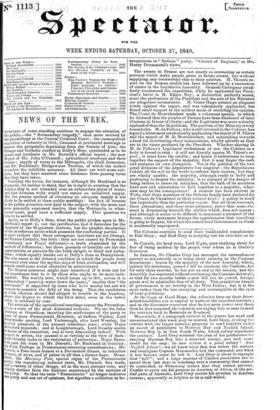NEWS OF THE WEEK.
SUBJECTS of some standing continue to engage the attention of the public,—the "Bermondsey tragedy," once more revived by the proceedings at the Central Criminal Court ; the cosmopolitan exposition of industry in 1851, discussed at provincial meetings to receive the peripatetic deputation from the Society of Arts; the Orange and Catholic conflict at Dolly's Brae, expounded as to its causes and incidents in Mr. Berwick's official report ; the new Repeal of Mr. John O'Connell ; agricultural meetings and their dreams ; supply of water to the Metropolis, the chalk formation, and Dr. Buckland's Bridgewater Treatise, of which the author avouches the infallible accuracy. All these are well-worn sub- jects, but they have received some freshness from passing turns that they have taken.
Touching the water, for instance, although Dr. Buckland is so dogmatic, we incline to think that he is right in averring that the London clay is not extended over an exhaustless abyss of water, and that Artesian wells would not secure an unlimited supply. But the precise method of obtaining an adequate supply is not likely to be settled at these public meetings: the fact of interest is the public attention now paid to the subject, with the more and more generally expressed resolve, that the Metropolis, in what- soever mode, must have a sufficient supply. That question we take to be settled.
Again, as to Dolly's Brae, what the public pitches upon in Mr. Berwick's report is, not the justification that it furnishes for the dismissal of the Magistrate abettors, but the graphic description of the murderous spirit which possesses the conflicting parties. It is quite evident that these outrageous incidents are not Orange, nor Roman Catholic, but Irish : they are not caused by Protestant ascendancy nor Papal influence,—a truth eliminated by the method of differences ; but those grounds of hostility are but the opportunities or pretexts for the Irish delight in blood and turbu- lence; which equally breaks out at Dolly's Brae or Donnybrook. 'The true cause is the debased condition in which the people have remained ever since the mythic days of Irish civilization, and will remain until some social alterative be administered.
The Repeal nonsense might pass unnoticed if it were not for the importance lent to it by those who ought to be more inde- pendent. The weekly rent, which keeps up to 301., unless it is a fraudulent "pouring water down the pump," implies that " the movement" is supported by some who have money but not wit enough to perceive the folly of the thing. That the candidates at Cork election should feel obliged to truckle to the humbug, shows the degree to which the Irish mind, even in the better order, is subdued by cant.
• The avowals of the agricultural meetings expose the Protection- nts in a state of the most distracted councils. We see Sir John Trollope at Grantham imputing the misfortunes of the party to want of more Protectionist Members; at Saffron Walden, Lord Braybrooke quoting Lord Yarboroughl ohm Lord Worsley, for hopeful prospects of the present transition state ; while Major" Beresford desponds; and at Loughborough, Lord Granby sneers at hopes of the transition, and is very desponding indeed. With respect to action, the counsel is as varying as the view of facts : ford Granby looks to the restoration of protection; Major Beres- a.rd puts his trust in Mr. Disraeli; Dr. Buckland in draining ; Sir John Trollope in Protectionist-returning constituencies ; Mr. Fowler, a Free-trade farmer at a Devonshire dinner, in reduction Of rents, of rates, and of pt5ces1irall'that a farmer buys. Mean- while, the Morning Post, special organ of the Protectionist party, sits repudiating reduced rents,, Mr. Disraeli, free trade, and a variety of other things, all in the most abstract vein, and wholly distinct from the fashions maintained by the sections of he party. So that the term " Protectionist " no longer indicates tee party and one set of opinions, but signifies a collection as he-
terogeneous as " Reform " party, "Church of England," or Mr. Henry Drummond's views.


























